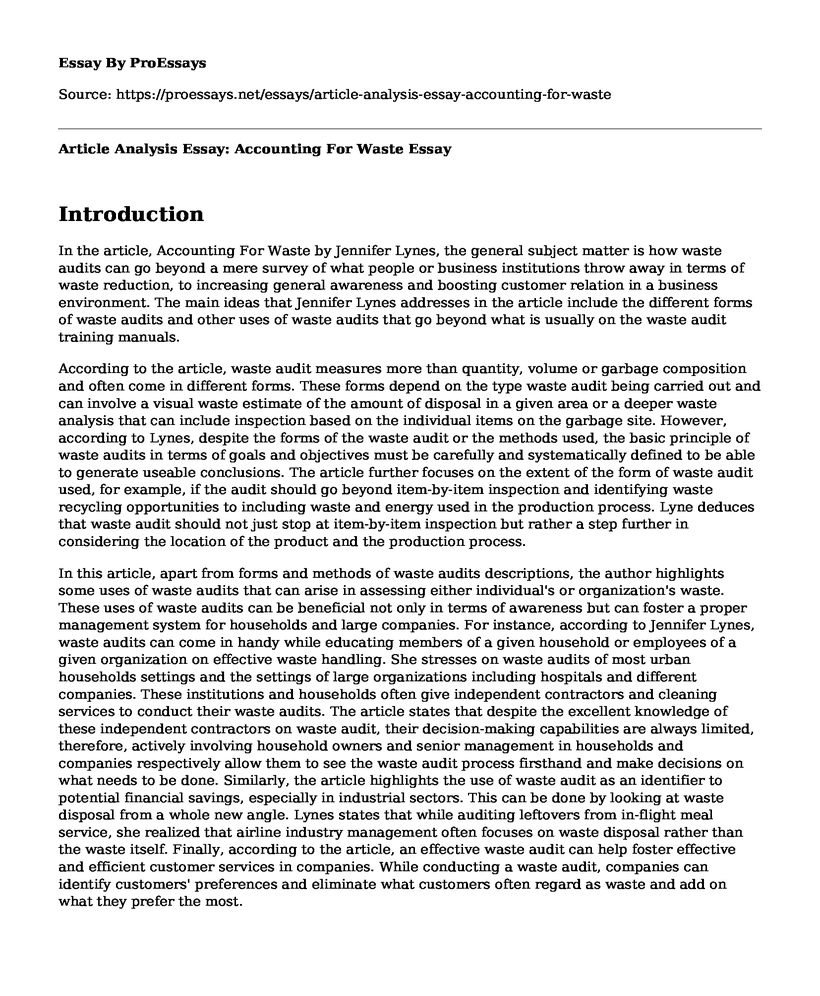Introduction
In the article, Accounting For Waste by Jennifer Lynes, the general subject matter is how waste audits can go beyond a mere survey of what people or business institutions throw away in terms of waste reduction, to increasing general awareness and boosting customer relation in a business environment. The main ideas that Jennifer Lynes addresses in the article include the different forms of waste audits and other uses of waste audits that go beyond what is usually on the waste audit training manuals.
According to the article, waste audit measures more than quantity, volume or garbage composition and often come in different forms. These forms depend on the type waste audit being carried out and can involve a visual waste estimate of the amount of disposal in a given area or a deeper waste analysis that can include inspection based on the individual items on the garbage site. However, according to Lynes, despite the forms of the waste audit or the methods used, the basic principle of waste audits in terms of goals and objectives must be carefully and systematically defined to be able to generate useable conclusions. The article further focuses on the extent of the form of waste audit used, for example, if the audit should go beyond item-by-item inspection and identifying waste recycling opportunities to including waste and energy used in the production process. Lyne deduces that waste audit should not just stop at item-by-item inspection but rather a step further in considering the location of the product and the production process.
In this article, apart from forms and methods of waste audits descriptions, the author highlights some uses of waste audits that can arise in assessing either individual's or organization's waste. These uses of waste audits can be beneficial not only in terms of awareness but can foster a proper management system for households and large companies. For instance, according to Jennifer Lynes, waste audits can come in handy while educating members of a given household or employees of a given organization on effective waste handling. She stresses on waste audits of most urban households settings and the settings of large organizations including hospitals and different companies. These institutions and households often give independent contractors and cleaning services to conduct their waste audits. The article states that despite the excellent knowledge of these independent contractors on waste audit, their decision-making capabilities are always limited, therefore, actively involving household owners and senior management in households and companies respectively allow them to see the waste audit process firsthand and make decisions on what needs to be done. Similarly, the article highlights the use of waste audit as an identifier to potential financial savings, especially in industrial sectors. This can be done by looking at waste disposal from a whole new angle. Lynes states that while auditing leftovers from in-flight meal service, she realized that airline industry management often focuses on waste disposal rather than the waste itself. Finally, according to the article, an effective waste audit can help foster effective and efficient customer services in companies. While conducting a waste audit, companies can identify customers' preferences and eliminate what customers often regard as waste and add on what they prefer the most.
Conclusion
In conclusion, according to the article, a carefully planned and an effective waste audit can not only survey what people and business organizations throw away, but can incorporate other uses of waste audits which include educating members of households and institutions, identifying potential financial savers and improving customer relation in the case of a business organization.
References
Lynes, Jennifer. (2006). Accounting for waste. Canada's Environmental Voice, 32(1), 23-24. Retrieved from http://web.b.ebscohost.com/ehost/detail/detail?vid=6&sid=3c86b449-f180-4aa8-a54c-4ab50581a154%40sessionmgr102&bdata=JnNpdGU9ZWhvc3QtbGl2ZQ%3d%3d#AN=20952861&db=aph
Cite this page
Article Analysis Essay: Accounting For Waste. (2022, Jul 14). Retrieved from https://proessays.net/essays/article-analysis-essay-accounting-for-waste
If you are the original author of this essay and no longer wish to have it published on the ProEssays website, please click below to request its removal:
- Article Review on ACO and Populations Health Management
- Do Student Loans Lead to Higher Tuition and Reckless Use of Funds? Essay
- Enron's Collapse: An Analysis Of The Root Causes
- Global Financial Regulation: Accounting Standards for Market Integration - Essay Sample
- Essay Example on USPS: Factors Contributing to Financial Difficulty
- Securing Wireless Networks: A Checklist
- The Politics of Performance Appraisal: Human Resource Management







